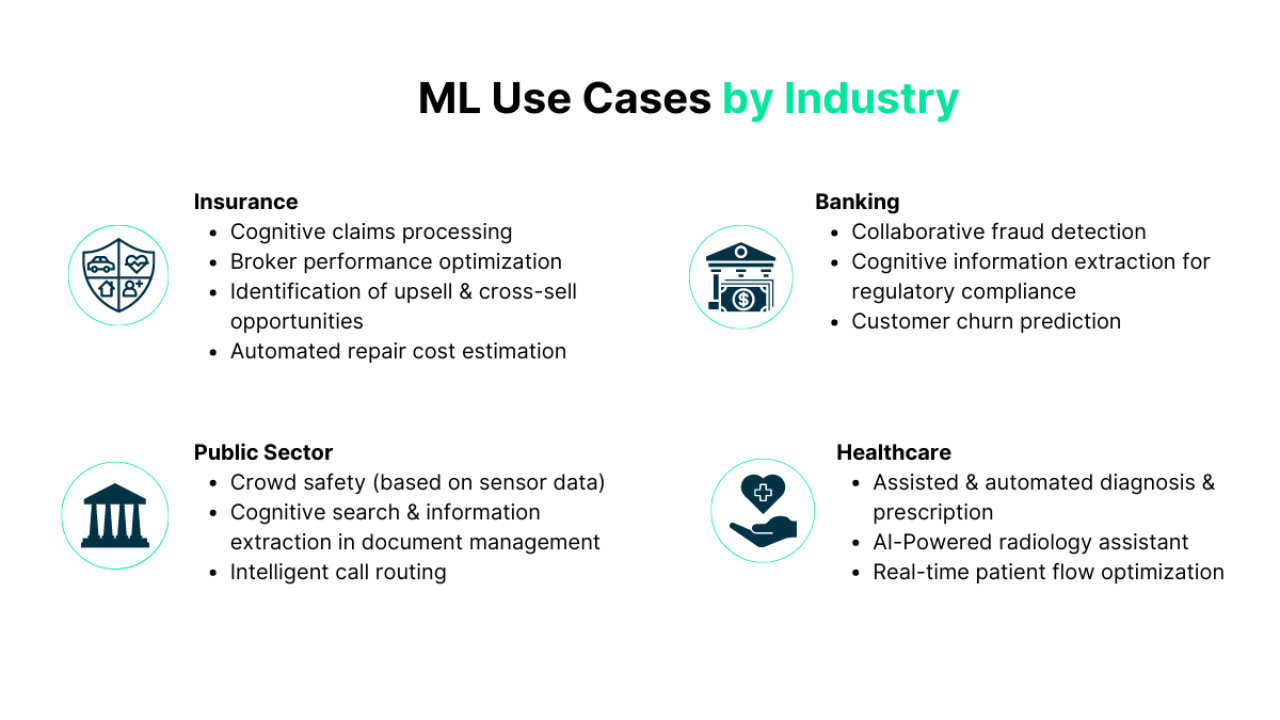Overview of machine learning
Before looking at business values that machine learning brings in, let’s learn how machine learning works. Machine learning is a tool for transforming data into knowledge. Thanks to the evolving digitalization, data has exploded in both volume and velocity. To uncover insights from the complexity of data, machine learning is leveraged to automatically detect hidden patterns and generate accurate predictions which assist organizations to make a variety of complex decisions.
Organizations use machine learning in their core process for a variety of strategic reasons, including the capabilities to find patterns and correlations, better cybersecurity postures, consumer segmentation and targeting, etc. Ultimately, they can boost revenue, cut costs, and improve market position.
3 Ways machine learning brings advantages to your business
1. Improve cybersecurity postures
Machine learning can be used in a variety of ways in cybersecurity to improve security procedures and make it easier for security analysts to quickly detect, prioritize, respond to, and remediate new threats so that suitable defense mechanisms can be built. Here are the 3 common applications that machine learning benefits organizations’ security postures:
- Automation: machine learning solutions help to complete activities like risk responses and remediation at a rate that would be impossible to do with only manual human capabilities. Specifically, triaging intelligence, malware detection, network log analysis, and vulnerability analysis are among the beneficiaries.
- Threat Detection and Classification: machine learning is employed to analyze big data from security events and detecting malicious behavior patterns. When similar occurrences are identified, machine learning uses the trained model to deal with them autonomously.
- Phishing: Traditional phishing detection algorithms aren't fast or accurate enough to distinguish between legitimate. and fraudulent URLs. Predictive URL classification methods based on the latest machine learning algorithms can detect trends that signify fraudulent emails
2. Improve business operations
Businesses can use machine learning techniques to reduce expenses and appoint human resources to higher-value tasks. Machine learning let developers create applications that automate tasks and augment current processes, resulting in increased productivity and cost savings.
- Optimizing production inputs: The use of machine learning models can assist organizations in lowering their facility costs. These models can help firms to better align resource utilization to their real demands by forecasting demand for output.
- Maintaining capital assets: It can be difficult and expensive to determine when capital assets require maintenance or upgrades. By gathering data on the operational performance of equipment and components, predictive machine learning models can keep track of asset problems. From there, machine learning models may be trained to assess performance and calculate crucial metrics like component lifetime remaining.
- Quality control: Quality assurance is an important aspect of the manufacturing process because it identifies faults and potential problems in machine processes before they happen. Manufacturers need machine learning technique to discover flaws, which can increase product yield, reduce warranty costs and the amount of rework required, and ensure product quality.

3. Revenue and growth
Machine learning can assist organizations to boost revenue by augmenting capabilities of data analytics models to efficiently handle the complex data at greater speed. Insights extracted from these advanced analytics tools are used to make accurate decisions and increase revenue in a variety of ways, from anticipating business outcomes and facilitating business strategy to enhancing consumer satisfaction. These insights, when used effectively, can help organizations achieve an unbeatable competitive advantage.
Organizations, for example, can utilize machine learning to handle customer data more strategically. You’ll learn which types of users are more likely to become customers and what's the behavior of your targeted customers. You can enhance revenue per consumer by better predicting "associated products".
Machine learning industrial use cases
Machine learning has gradually become a key technology that is being adopted organically across all industrial sectors to address complicated business issues while increasing an organization's operational effectiveness and scalability.
Followings are popular use cases in 4 corresponding industries:
Leverage machine learning to boost your business from now on
Thanks to our industrial standards and practical experiences in implementing machine learning projects, we can assist you in scaling your machine learning-driven initiatives to productions and find your competitive edge. Contact us to start your machine learning implementation for your business prospective growth today.






